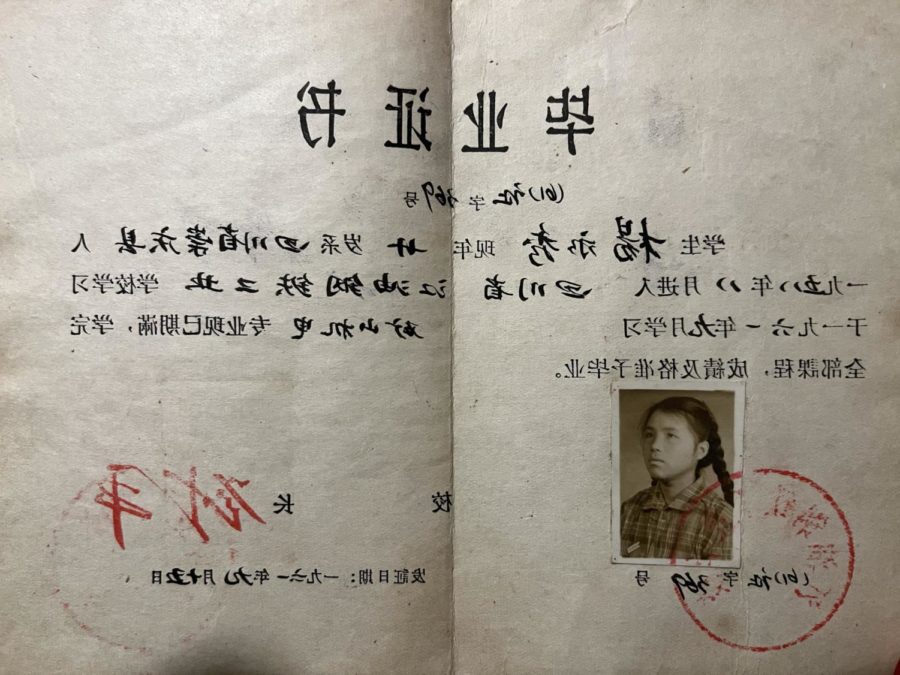My Grandmother and the Chinese Cultural Revolution
An individual account of living through the Chinese Cultural Revolution.
This is my grandmother’s Engineering Certificate, which she earned, allowing her to become an engineer.
When my grandmother first moved to the United States, I was around four, and far too young to grasp what China was, let alone the Chinese Cultural Revolution. All I knew of my grandmother was that she was the woman who took care of me and offered me reassurance when my parents were unavailable. She is engrained in many of my childhood memories: going to Central park on Sunday afternoons, cleaning the apartment to surprise my busy parents, taking the bus home late from school and fighting over ice cream with my sister. She has been an essential part in developing who I am.
It was not until I learned about the Chinese Cultural Revolution in my ninth-grade history class that I could begin to understand how that her childhood was drastically different from mine and that of most others. My grandmother was born in 1942, about two decades before the beginning of the Revolution, in a small town near the city of Chengdu. In order to learn more about her experiences, I conducted an interview with her about what it was like to live in late 20th century China.
What was your first important memory of the revolution?
My first important memory was in middle school. It was a Sunday, and I was walking back home with a classmate. We were coming home after school, and my classmate asked me to study review questions with her. While crossing a stone bridge working on the review questions, suddenly, the bridge collapsed into the river. Fortunately, we were in an area with shallow water, and were able to walk back to the riverbank safely. I felt very grateful that we were both safe, and it was then that I started to understand why some believe in a higher power.
According to your perspective, what was the Chinese Cultural Revolution?
In 1996, Chengdu, the city that I grew up in, was divided amongst three groups of revolutionaries: one conservative group, one organized and led by Sichuan University, and one led mainly by the University of Geology. People often asked us to join the protests. I told the people who asked us to join that I would only be able to participate during work hours and not after work hours.
Why were you only able to participate during work hours?
At first, I did not participate because I was pregnant with your mother. When I was able to, I could only do it during work hours, because after work hours I had to go home and take care of my family.
At the end of 1966, two groups started real fights. I was pregnant at that time, so I did not participate in the movement. Later, Lin Biao became the command-in-chief at the 9th People’s Congress and began to regularly broadcast the revolution songs. I still clearly remember the lyrics: “Yangtze river rolling towards the east, sunflowers blossoming towards the sun, chairman Mao personally guides us; armed with Maoism thought, we stride towards communism.”
How did these songs make you feel?
I felt that these songs were pleasant to listen to, and had a nice melody. This song in particular was a celebration of the assembly of the Congress meeting. I cannot say that the songs made me feel particularly proud of the nation, but they were full of vitality.
Were you afraid at any point during the fights?
Later the army and trucks armed with guns and cannons occupied the streets and the army paraded on the street. Your grand uncle carried your mom, who was a baby at that time, to watch the parade, and he said the scene was mighty.
I was not really afraid because it was about those people in charge, but it had nothing to do with me, and I just had to do my job so that I could get paid and provide for my family. However, I knew some who fled to Taiwan. I was a worker, so there wasn’t much I could do.
Could you explain the work that you did?
When I graduated from middle school, it was the steel making period in China. The goal was to create more than England and to catch up with the United States in fifteen years. I was admitted to Jianyou Institute of Iron and Steel, studying mine electromechanical as my major. Upon graduation, I was distributed and assigned to work at Jiangchun Iron Ore Mine. Years later, money ran out, and there was no more steelmaking. I was transferred to work at China Metallurgical Construction Corporation in Chengdu until I retired. It was a huge company, and there were two divisions: machinery installation and electrical installation. I was working at the electrical installation division, doing electrical installation and commissioning work for the construction of Chengdu Seamless Steel tube Plant. I always liked engineering, so I was happy with my job.
We fixed houses and installed machinery and connected adaptors, and taught others how to do it. It felt like we were helping others.
*These responses have been translated from Chinese to English, and edited for clarity, but they retain strong fidelity to the original conversations.
Rose Marabello is an Arts and Entertainment Section Editor for ‘The Science Survey.’ She enjoys writing engaging articles that showcase the brilliance...

